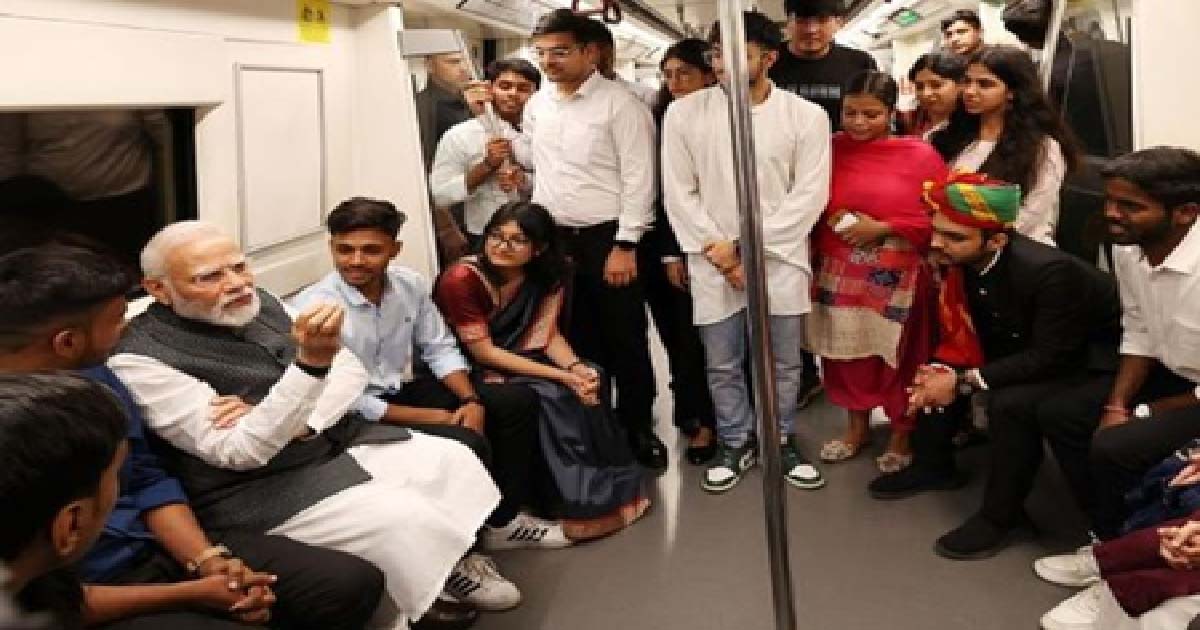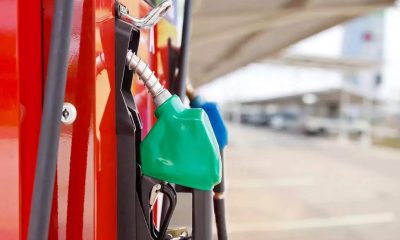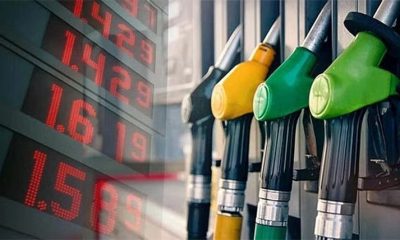Business
Petrol, diesel prices rise again on fresh surge in global oil prices

Prices of auto fuels petrol and diesel rose on Friday too as global oil surged again, with benchmark Brent crude gaining over 1 per cent to cross $83 a barrel.
Diesel prices increased by a sharp 35 paisa in the national capital to Rs 92.12 per litre on Friday while petrol prices increased by 30 paisa to Rs 103.54 a litre, according to the Indian Oil Corporation, the country’s largest fuel retailer.
Diesel prices have now increased on 12 out of the last 15 days taking up its retail price by Rs 3.50 per litre in Delhi. Its prices increased between 20-30 paisa per litre so far, but since Wednesday, it breached this to a 35 paisa per litre increase.
With diesel prices rising sharply, the fuel is now available at over Rs 100 a litre in several parts of Madhya Pradesh. This dubious distinction was earlier available to petrol that had crossed the Rs 100 a litre mark across the country a few months earlier. The fuel is getting close to Rs 100 a litre in Mumbai at Rs 99.92 a litre now.
Petrol prices had maintained stability since September 5 but oil companies finally raised its pump prices last week and this week given a spurt in the product prices lately. Petrol prices have also risen on nine of the previous 11 days taking up its pump price by Rs 2.35 per litre.
OMCs had preferred to maintain their watch prices on global oil situation before making any revision in prices. This is the reason why petrol prices were not revised for last three weeks. But extreme volatility in global oil price movement has now pushed the OMCs to effect the increase.
In Mumbai, the petrol price increased by 29 paisa to reach Rs 109.54 per litre while diesel rates increased by 37 paisa to climb to Rs 99.92 a litre.
Across the country as well, petrol and diesel increased between 30-40 paisa per litre but their retail rates varied depending on the level of local taxes in the state.
Fuel prices in the country have been hovering at record levels on account of 41 increases in its retail rates since April this year. It fell on few occasions but largely remained stable.
Crude price has been on a surge rising over three year high level of over $83 a barrel now. Since September 5, when both petrol and diesel prices were revised, the price of petrol and diesel in the international market is higher by around $9-10 per barrel as compared to average prices during August.
Under the pricing formula adopted by oil companies, rates of petrol and diesel are to be reviewed and revised by them on a daily basis. The new prices becomes effective from morning at 6 a.m.
The daily review and revision of prices is based on the average price of benchmark fuel in the international market in the preceding 15-days, and foreign exchange rates.
But, the fluctuations in global oil prices have prevented OMCs from following this formula in totality and revisions are now being made with longer gaps. This has also prevented companies from increasing fuel prices whenever there is a mismatch between globally arrived and pump price of fuel.
Business
Job postings in India stay above pre-Covid pandemic levels: Report

New Delhi, Nov 27: Formal job creation in India softened in the month of October but despite this, job postings remained above the pre-Covid pandemic level, a report said on Thursday.
“Amid slowdown, Indian job postings are still 60 per cent above pre-pandemic levels, but have fallen 25 per cent since their peak in January 2023,” Indeed, a leading hiring platform, said in its report.
Over the past three months, job postings declined in almost three-quarters of occupations. Yet in a softening job market, there will still be some strong performers, and the past three months have been no exception, said the report.
Job postings in cleaning and sanitation rose around 20 per cent over the past three months, ahead of community and social service (17.4 per cent), dental (13.1 per cent), nursing (11.2 per cent) and food preparation and service (10.3 per cent).
Another positive was the posting for human resources, which climbed 2.3 per cent.
However, these gains were more than offset by weakness in banking and finance, where postings fell 25.6 per cent, along with legal (-22.4 per cent), retail (-16.7 per cent) and loading and stocking (-15 per cent), the report noted.
Every month, the Indian workforce gradually transitions towards more formal work arrangements. As the nation transitions, job creation in the formal sector is expected to outpace overall employment growth nationwide, said Callam Pickering, Indeed’s APAC Senior Economist.
“This transition is also why job postings in India have been stronger than in other Indeed markets, both during the post-pandemic job boom and the subsequent slowdown,” he added.
Meanwhile, during the month, 9.1 per cent of Indian job postings explicitly mentioned phrases such as ‘work from home’ or ‘work remotely’ in their job descriptions. That’s up from 7.6 per cent a year ago.
Remote opportunities are most common in IT infrastructure, operations and support at 18.2 per cent of postings in the October quarter 2025, ahead of community & social service (15.1 per cent) and industrial engineering (14 per cent).
Business
From Kachchhi Kharek to Kesar Mango: Over 10 treasures of Kutch and Saurashtra earn GI tag

Gandhinagar, Nov 27: Prime Minister Narendra Modi has consistently championed India’s indigenous and heritage products, placing local strength at the heart of national growth. His call for Vocal for Local and Aatmanirbhar Bharat has given visibility to artisans and farmers across the country.
In line with this vision, the Prime Minister has also actively promoted Geographical Indication (GI) products, highlighting them in his radio address Mann Ki Baat and personally felicitating artisans who preserve traditional crafts.
Union Commerce and Industry Minister Piyush Goyal has set an ambitious goal of reaching 10,000 GI-tagged products across India by 2030 under the vision of “Vikas Bhi, Virasat Bhi.”
Gujarat has emerged as a strong contributor to this national mission by promoting its rich artisanal heritage, from Kutch’s celebrated crafts to Saurashtra’s premium agricultural produce on global platforms.
GI tagging reinforces the state’s commitment to “Viksit Gujarat to Viksit Bharat,” transforming local skills into global competitiveness. Kutch and Saurashtra together have secured GI recognition for over ten iconic products, including Ajrakh block printing, Bandhani tie-dye, Rogan art, Kutch shawls, the famed Kachchhi Kharek, and the globally loved Gir Kesar mango.
The upcoming Vibrant Gujarat Regional Conference (VGRC) in Rajkot will spotlight the region’s craft excellence and export capacity, offering artisans a robust platform to scale their businesses.
Renowned for its blend of tradition and artistry, Kutch boasts GI-tagged crafts such as embroidery, Ajrakh printing, Bandhani, Rogan painting and the Kutch shawl. In the agricultural category, Kachchhi Kharek — a celebrated variety of date known for its rich flavour and nutritional value has also earned GI status.
Saurashtra’s signature products include Gir Kesar mango, often hailed as the “Queen of Mangoes,” the famed Jamnagari Bandhani, and the exquisite Rajkot Patola silk weaving tradition, cherished by Bollywood celebrities.
Surendranagar’s Tangaliya shawl, with its intricate weaving technique, has also built a loyal international following. The upcoming VGRC for Saurashtra and Kutch aims to accelerate the region’s artisan economy.
The two-day conference will bring together entrepreneurs, artisans, interior designers and product designers, creating avenues of collaboration with the Government e-Marketplace, private enterprises, investors and leading e-commerce platforms. The event promises to enhance innovation, expand market access and drive sustainable growth for traditional craft clusters.
Business
Young innovators worldwide can find inspiration from confidence of India’s Gen Z: PM Modi

New Delhi, Nov 27: Prime Minister Narendra Modi on Thursday lauded India’s Generation Z for their confidence and capacity building.
Speaking via video conferencing at the inauguration of the Infinity Campus of Indian space startup Skyroot and unveiling its first orbital rocket, Vikram-I, PM Modi praised the country’s Gen Z for their positive mindset and creativity.
“Our youth, our Gen Z, are developing solutions to challenges in every sector. Young innovators around the world can find inspiration from the confidence of India’s Gen Z,” PM Modi said.
“The capacity building, positive mindset, and creativity of India’s Gen Z can set a global benchmark for Gen Z across the world,” he said.
Emphasising that India’s youth always place national interest above all and make the best use of every opportunity, PM Modi remarked that when the government opened the space sector, the country’s youth, especially the Gen-Z generation, came forward to take full advantage of it.
He highlighted that today more than 300 space startups are giving new hope to India’s space future, and noted that most of these startups began with small teams — sometimes two people, sometimes five, sometimes in a small rented room — with limited resources but with determination to reach new heights.
“This spirit has given birth to the private space revolution in India,” said the Prime Minister. He noted that Gen-Z engineers, designers, coders, and scientists are creating new technologies, whether in propulsion systems, composite materials, rocket stages, or satellite platforms.
PM Modi stressed that India’s youth are working in areas that were unimaginable just a few years ago.
He remarked that India’s private space talent is establishing a distinct identity across the world and added that today, for global investors, India’s space sector is becoming an attractive destination.
The Prime Minister remarked that the changes being witnessed in the space sector are part of the broader startup revolution taking place in India.
“Over the past decade, a new wave of startups has emerged across diverse sectors such as fintech, agri tech, health tech, climate tech, edu tech, and defense tech, with India’s youth, particularly the Gen-Z generation, providing innovative solutions in every field,” PM Modi said.
PM Modi emphasised that “India has now become the world’s third-largest startup ecosystem”.
There was a time when startups were confined to a few big cities, but today they are emerging from small towns and villages as well, the Prime Minister said, underlining that the country now has more than 1.5 lakh registered startups, with many of them having achieved unicorn status.
“India is no longer confined to apps and services but is now advancing rapidly towards deep-tech, manufacturing, and hardware innovation,” said the Prime Minister, thanking Gen-Z.
-

 Crime3 years ago
Crime3 years agoClass 10 student jumps to death in Jaipur
-

 Maharashtra1 year ago
Maharashtra1 year agoMumbai Local Train Update: Central Railway’s New Timetable Comes Into Effect; Check Full List Of Revised Timings & Stations
-

 Maharashtra1 year ago
Maharashtra1 year agoMumbai To Go Toll-Free Tonight! Maharashtra Govt Announces Complete Toll Waiver For Light Motor Vehicles At All 5 Entry Points Of City
-

 Maharashtra1 year ago
Maharashtra1 year agoFalse photo of Imtiaz Jaleel’s rally, exposing the fooling conspiracy
-

 National News1 year ago
National News1 year agoMinistry of Railways rolls out Special Drive 4.0 with focus on digitisation, cleanliness, inclusiveness and grievance redressal
-

 Maharashtra1 year ago
Maharashtra1 year agoMaharashtra Elections 2024: Mumbai Metro & BEST Services Extended Till Midnight On Voting Day
-

 National News1 year ago
National News1 year agoJ&K: 4 Jawans Killed, 28 Injured After Bus Carrying BSF Personnel For Poll Duty Falls Into Gorge In Budgam; Terrifying Visuals Surface
-

 Crime1 year ago
Crime1 year agoBaba Siddique Murder: Mumbai Police Unable To Get Lawrence Bishnoi Custody Due To Home Ministry Order, Says Report
















